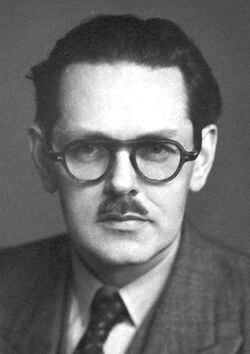Biography:Archer Martin
Archer Martin | |
|---|---|
 | |
| Born | Archer John Porter Martin 1 March 1910 London, England |
| Died | 28 July 2002 (aged 92) Llangarron, England |
| Alma mater | Peterhouse, Cambridge |
| Known for | Gas chromatography |
| Awards | Nobel Prize in Chemistry (1952) John Price Wetherill Medal (1959) |
| Scientific career | |
| Fields | Chemistry |
| Institutions | University of Sussex, University of Houston in Texas, EPFL |
Archer John Porter Martin CBE FRS (1 March 1910 – 28 July 2002) was a British chemist who shared the 1952 Nobel Prize in Chemistry for the invention of partition chromatography with Richard Synge.[1][2]
Early life
Martin's father was a GP. Martin was educated at Bedford School, and Peterhouse, Cambridge.[citation needed]
Career
Working first in the Physical Chemistry Laboratory, he moved to the Dunn Nutritional Laboratory, and in 1938 moved to Wool Industries Research Institution in Leeds. He was head of the biochemistry division of Boots Pure Drug Company from 1946 to 1948, when he joined the Medical Research Council. There, he was appointed head of the physical chemistry division of the National Institute for Medical Research in 1952, and was chemical consultant from 1956 to 1959.
He specialised in biochemistry, in some aspects of vitamins E and B2, and in techniques that laid the foundation for several new types of chromatography.[3] He developed partition chromatography whilst working on the separation of amino acids,[4] and later developed gas-liquid chromatography.[5] Amongst many honours, he received his Nobel Prize in 1952.[6]
After his retirement from the University of Sussex, he was visiting professor at both the University of Houston in Texas and the EPFL (École Polytechnique Fédérale de Lausanne) in Switzerland.[7][8]
He published far fewer papers than the typical Nobel winners—only 70 in all—but his ninth paper contained the work that would eventually win him the Nobel Prize. The University of Houston dropped him from its chemistry faculty in 1979 (when he was 69 years old) because he was not publishing enough.[9]
Awards
Archer Martin shared the 1952 Nobel Prize in Chemistry for the invention of partition chromatography with Richard Synge.[10][11]
Archer Martin's 1954 paper with A. T. James, "Gas-Liquid Chromatography: A Technique for the Analysis and Identification of Volatile Materials” reported the discovery of gas-liquid chromatography. This publication was honoured by a Citation for Chemical Breakthrough Award from the Division of History of Chemistry of the American Chemical Society presented in 2016 to the Francis Crick Institute.[12][13]
The research was actually performed at the National Institute for Medical Research in Mill Hill, which became the Francis Crick Institute in 2015.[14]
Martin was elected a Fellow of the Royal Society in 1950, and made a CBE in 1960.[15][16]
Personal life
In 1943 he married Judith Bagenal (1918–2006), and together they had two sons and three daughters.[15] In the last years of his life he suffered from Alzheimer's disease.
References
- ↑ "Gas Chromatography-Mass Spectrometry". https://www.acs.org/content/acs/en/education/whatischemistry/landmarks/gas-chromatography-mass-spectrometry.html.
- ↑ "Nobel Winner Archer Martin Dies". https://apnews.com/5ed3f757479daeef349ca528117234a9.
- ↑ Martin, A J P (1950). "Partition Chromatography". Annual Review of Biochemistry 19 (1): 517–542. doi:10.1146/annurev.bi.19.070150.002505. PMID 14771840.
- ↑ Martin, A J P; Synge, R L M (1941). "A new form of chromatogram employing two liquid phases A theory of chromatography. 2. Application to the micro-determination of the higher monoamino-acids in proteins". Biochemical Journal 35 (12): 1358–1368. doi:10.1042/bj0351358. PMID 16747422.
- ↑ Ettre, C. (2001). "Milestones in Chromatography: The Birth of Partition Chromatography". LCGC 19 (5): 506–512. http://images.alfresco.advanstar.com/alfresco_images/pharma/2014/08/22/1598ed6f-5bbe-400b-bc08-ff07d2c59826/article-2090.pdf. Retrieved 26 February 2016.
- ↑ Nobel Media. "Archer J.P. Martin – Facts". https://www.nobelprize.org/nobel_prizes/chemistry/laureates/1952/martin-facts.html.
- ↑ "Archer Martin, 92; Chemist Won Share of Nobel Prize in 1952" (in en-US). 2002-08-06. https://www.latimes.com/archives/la-xpm-2002-aug-06-me-passings6.4-story.html.
- ↑ "Nobel Winner Archer Martin Dies". https://apnews.com/article/5ed3f757479daeef349ca528117234a9.
- ↑ O'Connor, Anahad (2002-08-06). "Archer Martin, Nobel Laureate in Chemistry, Dies at 92" (in en-US). The New York Times. ISSN 0362-4331. https://www.nytimes.com/2002/08/06/world/archer-martin-nobel-laureate-in-chemistry-dies-at-92.html.
- ↑ "The Nobel Prize in Chemistry 1952 Archer J.P. Martin, Richard L.M. Synge". Nobel Foundation. https://www.nobelprize.org/nobel_prizes/chemistry/laureates/1952/.
- ↑ O'Connor, Anahad (6 August 2002). "Archer Martin, Nobel Laureate in Chemistry, Dies at 92". The New York Times. https://www.nytimes.com/2002/08/06/world/archer-martin-nobel-laureate-in-chemistry-dies-at-92.html.
- ↑ "Citations for Chemical Breakthrough Awards 2017 Awardees". http://www.scs.illinois.edu/~mainzv/HIST/awards/CCB-2017_Awardees.php.
- ↑ JAMES, AT; MARTIN, AJ (1954). "Gas-liquid chromatography; a technique for the analysis and identification of volatile materials.". British Medical Bulletin 10 (3): 170–6. doi:10.1093/oxfordjournals.bmb.a069416. PMID 13199288. https://academic.oup.com/bmb/article-abstract/10/3/170/264438?redirectedFrom=fulltext. Retrieved 12 March 2018.
- ↑ "Mill Hill History". The Francis Crick Institute. https://www.crick.ac.uk/about-us/background/mill-hill-history/.
- ↑ 15.0 15.1 Wright, Pearce (5 August 2002). "Obituary: Archer Martin". https://www.theguardian.com/news/2002/aug/05/guardianobituaries.highereducation.
- ↑ Lovelock, J. (2004). "Archer John Porter Martin CBE. 1 March 1910 -- 28 July 2002: Elected F.R.S. 1950". Biographical Memoirs of Fellows of the Royal Society 50: 157–170. doi:10.1098/rsbm.2004.0012. PMID 15754473.
External links
- Miss nobel-id as parameter
- Portraits of Archer Martin at the National Portrait Gallery, London
- Martin's Nobel lecture: The Development of Partition Chromatography
- M Martin's Column's: Classic Kit
 |


